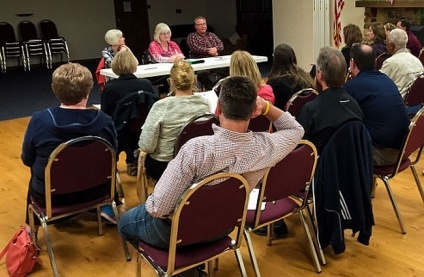The government has not set up an urban and regional planning commission and the law states that there must be that commission.
The review is necessary because we are talking about 2004 till date, which is almost 20 years and a lot of things have changed in Nigeria. Definitely, the law has to change.
We need to give kudos to states like Lagos that have been on top of the matter; with so many laws and currently operating the 2015 law, with which we have a regulation of 2019. I know few other states have also followed suit like Osun, Edo and Ondo. But many of the states have not domesticated the law.
Until we do that, it might be difficult to actually practice our profession. Incidentally, the profession is based on legal system and we need to know what the law says.
For states that haven’t domesticated the law, l will encourage them to do so because it is the only thing that can take us out of the current problem, regarding physical planning and economy.
The challenge we have is that until our political leaders begin to see physical development plan as an instrument that would help them to win the hearts of the people, then we won’t be able to get to where we planned.
It is so sad that the Federal Government, which is the proponent of the law, is yet to implement it. For instance, the government has not set up an urban and regional planning commission and the law states that there must be that commission. When you don’t implement that law at the Federal level, who will ensure that states domesticate it? The law which most of the states rely on is the 1946 Ordinance.
If the federal government implements the law, it would have enormous benefits because it would become possible to direct the growth of the nation, focus on new areas to open up for development.
The nation is currently trying to diversify from the monolithic economy, but we haven’t succeeded because there are no plans. But if other areas for diversification have been identified in a plan, it would easy to start implementing them one after the other and the economy will be of greater benefit.
Lagos, which has domesticated the law, is reaping the benefits with huge revenue. It has seen the flaws and improved on it. The observed lapses have also provided the leverage to include other areas asides the Lagos State Planning Permit Authority, Lagos Urban Renewal Agency (LASURA) and that is why you have the Lagos State Building Control Agency (LASBCA) law. They are as a result of the domestication because the state has seen the benefits.
Luckily for Lagos, it has been able to retain town planners at the helm of affairs in physical planning and that has also helped in the growth of the state. When states implement their laws, especially urban and regional laws, their economy will naturally improve because the law will ensure that people do what is right, that there are physical development plans and cities are organised.
All the economic losses that might have been happening will stop, people will be healthier and happier, while the political leader will be at the heart of the people and the party in government will also benefit. Implementing the urban, regional planning law will halt economic losses.
What are the challenges hampering urban and regional plans?
The former governor of Lagos State, Babatunde Fashola, said only two sets of people are important, the town planners and economic planners. Town planners come first and the economic planners follow. One of the challenges is ignorance and lack of political will by the leaders.
A governor was quoted to have said that, “you asked me to come and do physical development plan, master plan and spend N1 billion but with that money, l would have constructed roads.” That is ignorance of the highest order because the point is you would do your road but it has to be done in a coordinated manner.
It is physical development plan that will state the hierarchy of things and how they should appear in terms of the road in a coordinated manner, the water system, other infrastructure and how to connect other cities as well as direct growth of the city.
The city must be planned and until we do that, we can’t move forward. Lagos state has five fingers growth pattern, and we also say let’s create in Ogun State a three fingers growth pattern and Osun state can also create its own growth plan. So, it is easier when there are physical development plans.
In other parts of the world, governments invest so much in physical planning and when you invest in physical planning, the rest will fall in line and there won’t be disjointed development because cities will grow and there will be infrastructure.
Nigeria is a signatory to several global agreements such as the New Urban Agenda, Sustainable Development Goals (SDGs) and Paris agreement. Are you satisfied with their implementation in the built environment? Do you foresee the government attaining these targets?
I am not satisfied so far. We are not saying the government is not trying but there are quite a number of things to do and grounds that need to be covered. Except we are ready to do that, we won’t be at Eldorado. SDGs talks about cities and community development, can we talk about developing cities without development plans? The urban agenda states that we should focus on an area but we are not focusing on anything. I don’t know the last time l saw pipe borne water in Lagos, in Osun people rely on self-help for water.
SDGs say no hunger and poverty, in our case; we haven’t seen it as a serious matter. We only take it on the surface and people are rather helping themselves without consideration for others, forgetting that the people they abandon will cause problem for them tomorrow. You go on the road and you are afraid of people who haven’t been taken care of.
Lagos as a resilient city has a resilienr officer but how many states have learnt from that. Lagos is expanding and accommodating. It’s not impossible for government to attain some of the targets of these agendas but it would demand a lot of work.
The poverty line is huge currently and people that earn money, the resources are not enough to sustain them. If the wealth in the country is spread across, it may be easy to attain those goals.
Our cities must be well planned and we must ensure that when it’s stretched, it doesn’t collapse. We are currently seeing infrastructure collapse and people dying in large numbers because when issues happen, our response time is not too fast.
The United Nations set timelines of 2030 for SDGs but by that time, Nigeria may not be ready. All states must put politics aside and do their work by putting the cities in the global setting for growth to be measured.
As the new president of ATOPCON, what innovations are you bringing on board to enhance the profession?
The town planners have moved forward and our consultants are handling jobs that ordinarily you would think they couldn’t handle in the past. The next stage is to ensure that our people are more engaged. We are also adding firms to join the fold so that our members can be exposed to job opportunities across the states. Lagos has tested our members and realised that we are competent to handle jobs.
We plan to assist government on developmental issues through our advisory committee. The association is also encouraging our members to embrace current technology to deliver jobs on time, to specification and global standards. Some of our people are technology-savvy now and are experts in Geographic lnformation System (GIS).
Cities are growing without commensurate socio-economic development. How do we ensure sustainable development in these cities, check illegal structures, informal settlements in rural and urban centres?
Incidentally, our society is more of informal sector based and the growth is not the way it is supposed to be. We need to move ahead. The increasing population is putting pressure on Lagos and that is why l feel the Federal Government needs to declare Lagos as a special city, not only as an economic hub but a city that can be showcased to the world.
The facilities in the city are not enough except for the core areas. In other areas, you cannot see infrastructure there. People now resort to self-help. Government needs to brace up and be alive to its responsibilities by providing basic infrastructure for the people. Because our villages are neglected, people move in large numbers to the cities. We need to develop the outskirts so that people won’t have interest in migrating to the cities.
Many of the cities are challenged by urban shocks such as fire outbreaks, flooding and traffic congestions. What role should planners play in mitigating these problems?
Government has not seen town planning as serious tool for developmental purposes. For instance, in Kwara State, the government developed a law on GIS, not planning. Whereas GIS is an instrument or tool in physical planning, so, how can you create law for GIS when you don’t have any town planning law? That is the ignorance.
Only few states like Lagos have the state emergency management agency for tacking emergency situations. That’s why it was easier to respond to the shock of Ebola and outbreaks of COVID-19 pandemic.
LASEMA has a place for warehousing equipment but I don’t know about the National Emergency Management Agency. If you don’t have equipment to tackle shock, what will you deploy? When the collapsed building incident occurred in lkoyi, what should have happened within 30 minutes is that everybody is assembled there.
But, before people came in, a lot of people had died. Our emergency response rate is slow because our shock absorber is not good enough. Until we have good shock absorbers, only then will it be easy to tackle urban shocks.
Through involvement of town planners, we can tackle the terrific traffic situation in a city like Lagos; there’s no reason to be in traffic for two or three hours. It does not make sense because manpower is lost on daily basis.
If town planners are engaged and empowered they can use planning to create alternative roots because planning is about creating solutions for people, the same way plans can be used to mitigate fire outbreaks and flooding.
Government can do more by ensuring that response to urban shock is quicker. Only one collapsed building, it took us long time to respond, whereas it takes short time to die. Other states need to copy what Lagos is doing by setting up emergency units.
Although, it is capital intensive it is needed through planning because urban shock can consume the entire city, if not properly managed. It is the town planners’ role to ensure that urban shocks are tackled properly even before they occur.
The Nigerian housing deficit, especially for low-income earners is huge. What reforms do we need to boost affordable supply for people in that cadre?
I will encourage our government to focus attention at creating enabling environment for people to access housing. You can have government housing schemes and government can redirect our tax system.
People at the top can pay high taxes while the government redistributes by taking it down, using the fund to develop houses for low-income earners. We can refocus on one-bedroom, two-bedroom, self-contained and three bedroom apartments.
Our housing planning rules must be reviewed to make land accessible, reduce the cost of building materials and provide infrastructure for housing development.
Government should also let our mortgage system work properly for people to access mortgage easily. The Federal Mortgage Bank of Nigeria should be empowered and in turn empower the primary mortgage institutions for people to have access to them.



